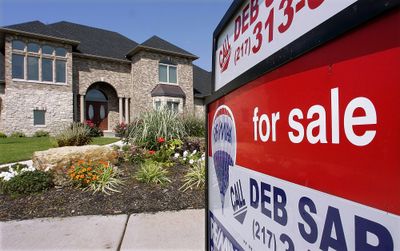Economy takes more hits
Factory orders, home sales fall as unemployment claims soar

WASHINGTON – Weekly jobless claims surged to the highest level in seven years, durable goods orders took a bigger-than-expected tumble and new home sales plunged to the slowest pace in 17 years, according to government data released Thursday.
The latest trifecta of bad news about the economy raised new worries about a possible recession and underscored the concerns that are driving Congress and the White House to reach agreement on a historic bailout of the financial system.
The Labor Department reported that jobless claims jumped by 32,000 to a seasonally adjusted 493,000 last week, the highest level since shortly after the Sept. 11, 2001, terrorist attacks and far above what economists had been expecting.
Labor Department analysts said that Hurricanes Ike and Gustav added about 50,000 claims, but even discounting the adverse impact from job disruptions in Louisiana and Texas, the four-week average for claims rose to 445,000, the highest it has been since November 2001, the month the last recession ended.
In a second report, the Commerce Department said that new orders to factories for big-ticket manufactured goods fell by 4.5 percent last month, led by a big drop in demand for airplanes but also reflecting weakness in everything from autos to primary metals and machinery.
It was the largest setback since a 4.7 percent fall in durable goods orders in January and raised worries that the weakening economy was causing corporations to cut back on their investment spending plans.
The third weaker-than-expected report showed that new home sales plunged by 11.5 percent in August, a much bigger decline than the 1 percent dip that had been expected. It pushed sales down to a seasonally adjusted annual rate of 460,000, the slowest pace since January 1991.
The average price of a new home fell in August by 11.8 percent to $263,900, the biggest one-month drop on record. The median home price was down 5.5 percent to $221,900.
Analysts said the trio of bad reports meant the third quarter was ending on an extremely weak note and raised the risks that the October-December quarter will actually slip into negative territory. Many economists believe the gross domestic product will be negative in both the final three months of this year and the first three months of 2009, meeting the classic definition of a recession.
GDP measures the value of all goods and services produced within the U.S. and is the best barometer of the country’s economic health.
Some analysts said the weakening economic reports raised the possibility that the Federal Reserve will move to cut interest rates, possibly in an emergency move between meetings.